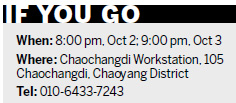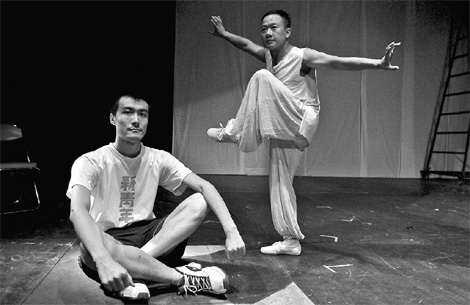Life and Leisure
Pushing the boundaries
By Xu Lin (China Daily)
Updated: 2010-09-27 16:13
 |
Large Medium Small |
|
Wang Chong (front) at a rehearsal of his latest production Hamletmachine. Jiang Dong / China Daily |
Director Wang Chong's latest production, Hamletmachine, combines physical theater with Peking Opera. Xu Lin reports
At a time when most people cannot imagine life without a cell phone, 28-year-old theater director Wang Chong has gone without one for five years.
Wang says he threw out his phone when he realized that not receiving a response to a text message to a friend within three minutes of sending it would make him so agitated that he would begin to wonder if the relationship was falling apart.
This means the sensitive director can only be reached at rehearsals and performances.
His latest production Hamletmachine, a 1977 post-modernist drama by German playwright Heiner Muller, saw two sold-out performances at the 2010 Beijing Fringe Festival held recently.
This is Muller's first play to be staged in the Chinese mainland. Wang's interpretation combines physical theater with Peking Opera style movements, interspersed with recorded monologues of Hamlet and Ophelia and big-screen projections of key historical events.
"Text is unimportant as stage performance is the core of theater such as physical theater," Wang says. "I like physical theater which is a big departure from traditional Chinese drama. Mainstream Chinese drama depends on dialogue. But that is just like karaoke, one only has to recite the lines."
Meng Jinghui, China's leading avant-garde theater director and organizer of the annual Beijing Fringe Festival says, "It's a good combination of Chinese opera and post-modernism. Wang is talented. I like his works which always challenge the audience."
Wang grew interested in theater while studying law at Peking University, a place known for its thriving arts-and-culture scene, in 2000.
In 2004, the drama fan got an opportunity to perform in Chekhov's The Cherry Orchard directed by Lin Zhaohua, who pioneered Chinese experimental theater in the mid-1980s.
"It was a minor role with only a couple of lines. But I did have to appear with my head shaved," he recalls.
That experience made him decide to pursue drama studies at the University of Hawaii where he earned his master's degree in theater in 2007. He then moved to the Universityof California, Irvine, for his PhD. But he quit a year later, eager to create something rather than pursue pure theory.
He then enrolled at the Watermill Center in New York to learn with Robert Wilson, the renowned American avant-garde stage director and playwright.
In 2006, Wang's debut work Hamletism was shown at Beijing's College Theater Festival to wide acclaim.
He founded Thatre du Rve Exprimental (TRE) at the end of 2008 and the company toured Quebec with his work e-Station, which was nominated for the best production of 2009 at the Mont-Laurier International Theater Festival.
TRE, comprising several post-'80s performers, put up more than 50 shows in seven cities in China, the United States and Canada in 2009.
His best-selling work is The Vagina Monologues, the only version authorized in the Chinese mainland, which has won high praise from media at home and abroad. The original feminist work, which has been performed in more than 120 countries in at least 45 languages, has sparked much controversy for its no-holds-barred discussion of a woman's body and female identity.
The play saw 17 sold-out performances in Beijing, Shanghai and Shenzhen in 2009, with a return to Shenzhen scheduled for October.

"Shenzhen, while famous for its economic success, is considered a cultural desert, but the play was warmly received there. Most in the audience were young people, but also included some middle-aged women," Wang says.
His next work, the ninth of his experimental series, The Peking OperaTION will run in Beijing's Caochangdi Workstation on Oct 2 and 3. It is also a combination of physical theater and Peking Opera.
This is Wang's third appearance at the Beijing Fringe Festival. "The festival gives young directors like me a platform to showcase our vision and ambition. Director Meng believes we represent the power that will take Chinese theater forward.
"In the mainstream theaters, people like to restage classic works that bear no relation to today's society and do not attract young audiences. Theater must tackle reality and be able to touch the audience," he says.
